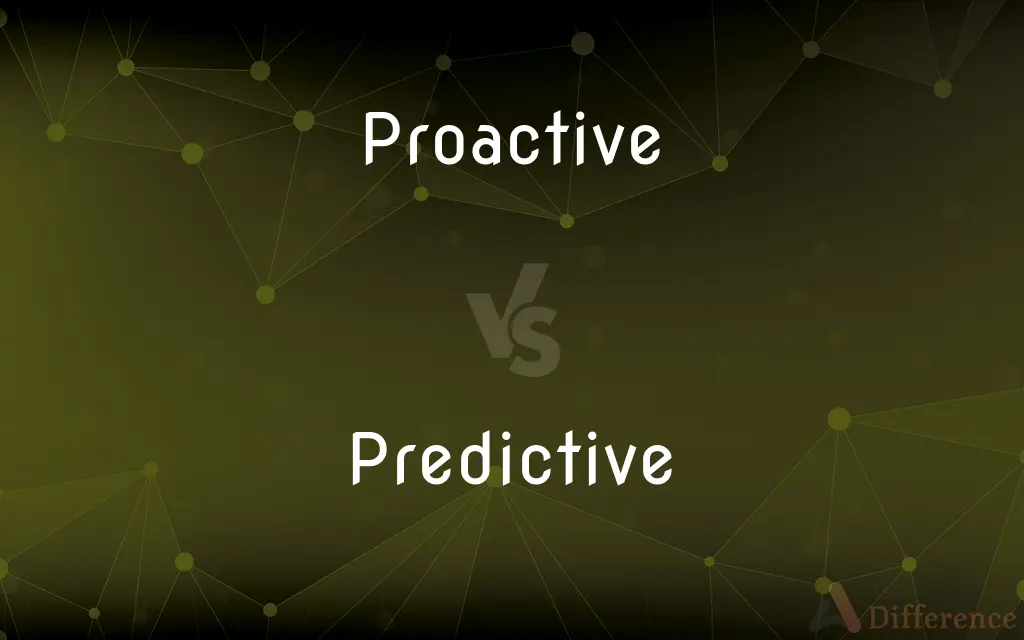Proactive vs. Predictive — What's the Difference?
By Tayyaba Rehman & Urooj Arif — Updated on April 17, 2024
Proactive involves taking initiative to influence outcomes, while predictive focuses on using data to forecast future events.

Difference Between Proactive and Predictive
Table of Contents
ADVERTISEMENT
Key Differences
Proactive behavior involves acting in advance to prevent problems or create opportunities, emphasizing control and initiative. Predictive behavior, on the other hand, relies on data analysis to anticipate future scenarios, focusing more on preparation than action.
Proactive strategies are commonly seen in crisis management and personal development, where taking early steps can mitigate risks or enhance personal growth. Predictive strategies are often used in business and technology to model potential outcomes and strategize accordingly.
In proactive approaches, decision-making is driven by a desire to change future outcomes based on current actions. Predictive approaches, whereas, are driven by forecasts and probabilities derived from historical data, influencing decisions more passively.
Proactive measures can sometimes lead to significant resource expenditure without the certainty of benefit, as actions are taken based on possibilities rather than certainties. Predictive measures, on the other hand, aim to optimize resource use by acting based on likely scenarios.
While proactive actions are typically general and broad, aiming to cover a wide range of potential issues, predictive actions are more specific, targeting likely events based on past trends and patterns.
ADVERTISEMENT
Comparison Chart
Focus
Influencing future outcomes
Forecasting future events
Basis of Action
Intuition, foresight
Data analysis, historical trends
Strategy Type
Often general and broad
Usually specific and targeted
Risk
High, due to uncertainty and early action
Lower, based on likely scenarios
Common Applications
Crisis management, personal development
Business forecasting, technological models
Compare with Definitions
Proactive
Acting in anticipation of future problems, needs, or changes.
The company's proactive stance on remote work helped it smoothly transition during the pandemic.
Predictive
Relating to or involving the prediction of future events.
Predictive analytics help businesses anticipate market trends and consumer behavior.
Proactive
Displaying readiness and anticipation in actions.
Her proactive planning for the project allowed the team to meet their deadlines comfortably.
Predictive
Based on data analysis to forecast future scenarios.
They used predictive modeling to estimate the future costs of the project.
Proactive
Engaging in deliberate actions to control a situation.
He was proactive in setting up meetings with potential clients to expand his network.
Predictive
Employing statistical techniques to deduce probabilities.
Predictive policing uses data to forecast where crimes are likely to occur.
Proactive
Involvement in preventive measures.
Proactive maintenance of machinery ensures longer service life and fewer breakdowns.
Predictive
Focused on identifying patterns from historical data.
The team developed a predictive tool to identify potential failures in the manufacturing process.
Proactive
Taking initiative to influence future outcomes.
She adopted a proactive approach to improve her health by starting a new diet and exercise plan.
Predictive
Aimed at optimizing decisions and resource allocation.
Predictive maintenance schedules repairs based on expected machinery wear and tear.
Proactive
(of a person or action) creating or controlling a situation rather than just responding to it after it has happened
Employers must take a proactive approach to equal pay
Predictive
To state, tell about, or make known in advance, especially on the basis of special knowledge
Predicted an active hurricane season because of warmer ocean-surface temperatures.
Proactive
Acting in advance to deal with an expected difficulty; anticipatory
Proactive steps to prevent terrorism.
Predictive
To foretell something.
Proactive
Acting in advance to deal with an expected change or difficulty
We can deal with each problem as it pops up, or we can take a proactive stance and try to prevent future problems.
Predictive
Useful in predicting.
The amount of rain in April is predictive of the number of mosquitoes in May.
Proactive
Descriptive of any event or stimulus or process that has an effect on events or stimuli or processes that occur subsequently;
Proactive inhibition
Proactive interference
Predictive
(computing) Describing a predictor.
Proactive
(of a policy or person or action) controlling a situation by causing something to happen rather than waiting to respond to it after it happens
Predictive
(medicine) Expressing the expected accuracy of a statistical measure or of a diagnostic test.
Predictive
(grammar) A conditional statement that includes a prediction in the dependent clause (e.g. "if it rains, the game will be cancelled", "give her an inch and she'll take a mile.").
Predictive
(statistics) Simulated data generated from a statistical model, based on the estimates for the real data.
Predictive
Foretelling; prophetic; foreboding.
Predictive
Of or relating to prediction; having value for making predictions
Common Curiosities
How do predictive strategies benefit businesses?
They allow businesses to anticipate changes and adapt strategies effectively.
Can proactive approaches be combined with predictive models?
Yes, integrating proactive actions with predictive insights can lead to more comprehensive strategies.
What is the main goal of proactive actions?
To take control of situations and influence future outcomes positively.
How do proactive and predictive strategies impact decision-making in management?
Proactive strategies empower managers to take charge and act before issues arise, while predictive strategies provide data-driven insights that help in making informed decisions.
What types of industries benefit most from proactive strategies?
Industries such as healthcare, emergency services, and environmental management often benefit from proactive strategies due to the critical need for preventing problems before they occur.
What is a key risk in proactive strategies?
They may lead to unnecessary actions or resource use if the anticipated situations do not materialize.
What is a common tool used in predictive strategies?
Machine learning algorithms are common tools in predictive strategies, as they can process large amounts of data to identify patterns and make forecasts.
What is an example of a predictive tool in technology?
An example is predictive text in smartphones, which anticipates what the user will type next based on historical typing data and language models.
How do predictive models utilize data?
They analyze historical data to forecast future trends and behaviors.
How can a company transition from being reactive to being proactive or predictive?
A company can transition by investing in training for foresight and strategic planning to cultivate a proactive culture, and by adopting technology that enables data analysis for predictive insights.
Share Your Discovery

Previous Comparison
Comfort vs. Console
Next Comparison
Transport vs. TravelAuthor Spotlight
Written by
Tayyaba RehmanTayyaba Rehman is a distinguished writer, currently serving as a primary contributor to askdifference.com. As a researcher in semantics and etymology, Tayyaba's passion for the complexity of languages and their distinctions has found a perfect home on the platform. Tayyaba delves into the intricacies of language, distinguishing between commonly confused words and phrases, thereby providing clarity for readers worldwide.
Co-written by
Urooj ArifUrooj is a skilled content writer at Ask Difference, known for her exceptional ability to simplify complex topics into engaging and informative content. With a passion for research and a flair for clear, concise writing, she consistently delivers articles that resonate with our diverse audience.
















































